The Costa Blanca in the Alicante province is a popular tourist destination. Its 120 miles of Spanish coastline is home to a number of well-known holiday hotspots, such as Benidorm.
But what about settling down there as an expat? Well, there are plenty of reasons why this is a great idea, particularly if it’s long been a popular holiday destination of yours.
In this guide, we’ll go over exactly what it’s like to live on the Costa Blanca in the Alicante province. We’ll discuss property availability, cost of living, and some helpful tips for making the most of the local culture.
Secure Peace of Mind with Best-Value International Health Coverage
International Citizens Insurance provide free, no-obligation quotes from the leading international health insurance providers with plans tailored to meet your needs. Trusted by thousands of expats worldwide.
Is the Alicante Province a good place to live?
Alicante is known for its sandy beaches, beautiful weather, and popularity as a tourist destination. Its location on the Mediterranean coast keeps temperatures fairly balanced all year, and the province is well connected, both internationally and locally.
Of course, living on the Costa Blanca is typically a different experience to going there on holiday. You have to consider things like accessible property, food prices, and other factors necessary for living comfortably.
Luckily, living on the Costa Blanca and the Alicante province does feel like an extended holiday. The Costa Blanca is one of the most popular Costas in Spain for expats and for good reason.
There are plenty of towns and villages inland that aren’t as heavily influenced by the tourism industry but are still close enough to the area’s glorious beaches.
The good weather is obviously a major draw for tourists. The peak summer months are June and July when Alicante gets up to 11 hours of sunshine a day. Summer temperatures generally sit around 29-31 degrees C, while winter temperatures rarely drop below 7 degrees C.
As you can imagine, the Costa Blanca is graced with plenty of amazing restaurants, and the bar scene is big too. If you prefer to integrate with the locals, then you simply need to find the right bar!
For those interested in culture, there are some relevant activities in Alicante. You’ll find medieval castles and historic fishing villages, along with local markets. But don’t expect the same kind of cultural heritage you’d find somewhere like Madrid, as Alicante is much more geared towards tourism.
Importantly, there are plenty of beautiful outdoor spaces where you can go and enjoy the nice weather. Along with beaches, Alicante has a number of nature parks, including the Guadalest Valley. The Costa Blanca is also popular with climbers because it has a lot of limestone crags and cliffs.
Finally, the Costa Blanca and the wider Alicante province are popular ex-pat retirement destinations. While this can either be a massive pro or a slight con, the key thing is that you won’t have difficulty making friends who speak your language.
To summarise, the Costa Blanca and Alicante province are great choices if you are moving to Spain. They have beautiful weather, friendly people, and good food. If these things are important to you, then you could do a lot worse than Alicante.
Is the Costa Blanca safe?
The Costa Blanca is a fairly safe place to live. Its crime rate is lower than the European average but slightly higher than Spain’s national average. This kind of statistic is fairly common in tourist hotspots.
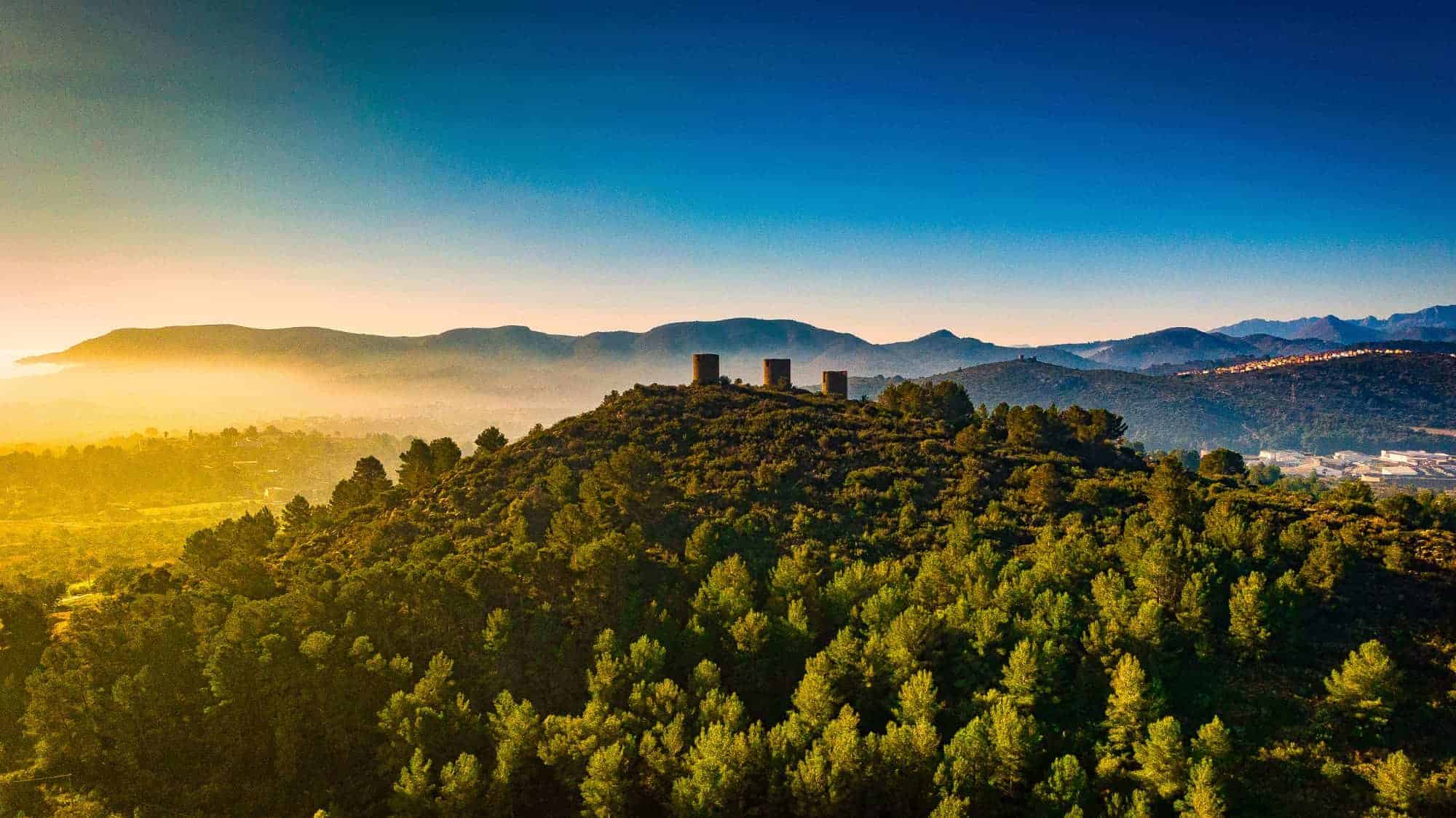
The Costa Blanca and the wider Alicante province have low levels of crime. The only factor that rates moderate is the increase in crime over the last three years.
Luckily, types of crime such as racial abuse, drug crime, and theft are all low or very low.
Also, safety walking alone during the day or night is rated high or very high. This is likely because Alicante is such a popular tourist destination, and so the local government probably makes a significant effort to keep things safe so it remains popular.
On the whole, Alicante’s crime rate is negligible. In short, the Costa Blanca and Alicante province are good places to settle down where you don’t have to worry about crime-related issues.
The pros and cons of living in Alicante, Spain
The Costa Blanca and Alicante clearly have a lot to offer expats looking to settle down. But like any other destination, there are some potential downsides worth considering. While it’s unlikely any of these are deal-breakers, it’s always worth weighing up both sides.
Here’s a clear list of the pros and cons of living in Alicante and the Costa Blanca.
The pros of living in Alicante:
1. Good international connections
Alicante-Elche Airport is the fifth-busiest airport in Spain and obviously has great connections to the UK, Europe and beyond. This makes it super easy to pop back to visit family and friends on a whim, or for them to come to visit you.
2. Friendly communities
Whether you choose to mix with other expats or integrate into Spanish communities, Alicante is full of friendly people. You should find it really easy to make friends because most people are happy to stop and chat, and restaurants and bars are major social hubs.
3. Great food
Spanish food in Alicante benefits from the Mediterranean’s proximity, meaning there’s plenty of fresh fish and seafood. Paella is obviously a must, there’s plenty of choice for meat-eaters, but maybe not so much for vegetarians. Regardless, there’s plenty of good wine to wash it all down!
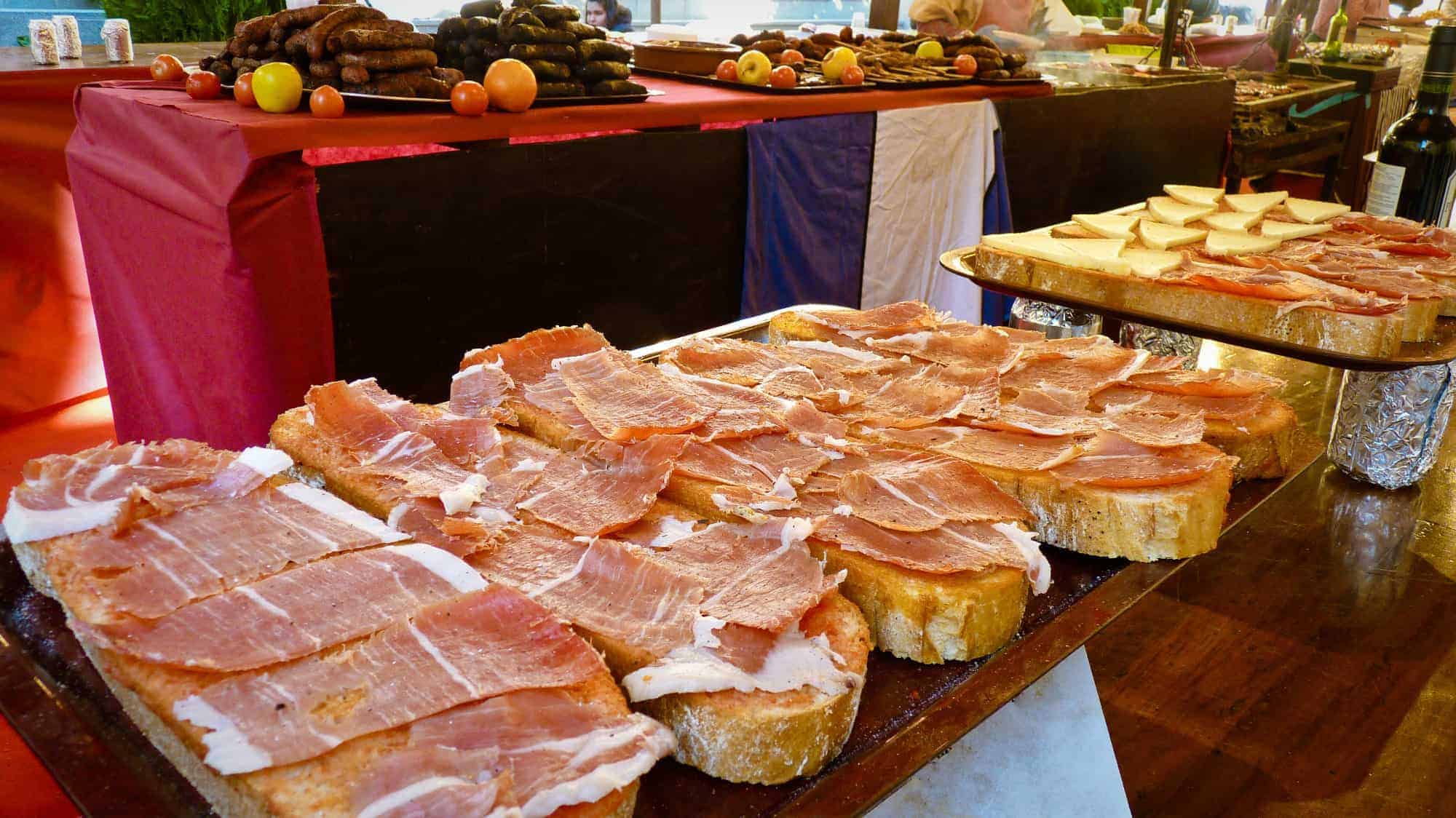
4. Amazing weather
As mentioned, Alicante is statistically the sunniest place in eastern Spain. Combine this with balanced temperatures and lack of rain, and what more do you need?
5. English is common
English is a commonly spoken language in Alicante thanks to tourism. Of course, if you want to really get in with the locals you’ll need to learn Spanish, but it’s not a big must.
6. Low cost of living
The Costa Blanca and Alicante have relatively lower living costs than the rest of Spain. This is obviously a benefit for retired expats because it means the money goes further, even on basic necessities.
The cons of living in Alicante:
1. Slow pace of living
While not explicitly a con, this might be an area where expats need adjustment. Spain, like many European nations, is famous for its slow pace of life, including important business matters. Be prepared to wait in line a lot and to fill out a lot of paperwork.
If the prospect of doing all the paperwork on your own terrifies you, you can always recruit a local helper - gestor. Find out more in our guide to Using Gestorias In Spain To Help With Your Paperwork.
2. Tourist crowds
High levels of tourism mean hotspots can become incredibly crowded in the summer. One way to overcome this is to spend the off-season searching out lesser-known beaches and towns where you can escape the crowds come summer.
3. Little chance of living an authentic Spanish lifestyle
If you’re looking for an authentic Spanish lifestyle, Alicante might not be the best choice. Its popularity with expats means it can be difficult to find a “local” experience. However, you probably already know this if you’ve been to Alicante.
4. Difficult job market
While finding a job might not be a big issue for many expats, it’s still worth mentioning. The economy is very seasonal, so reliable work can be a challenge. One option is to set up a business or work remotely.
How much does it cost to live in Alicante, Spain?
The cost of living in Alicante is comparatively lower than in the rest of Spain. There are variations in price between towns and rural areas, and tourist hotspots tend to be more expensive for both property and living costs.
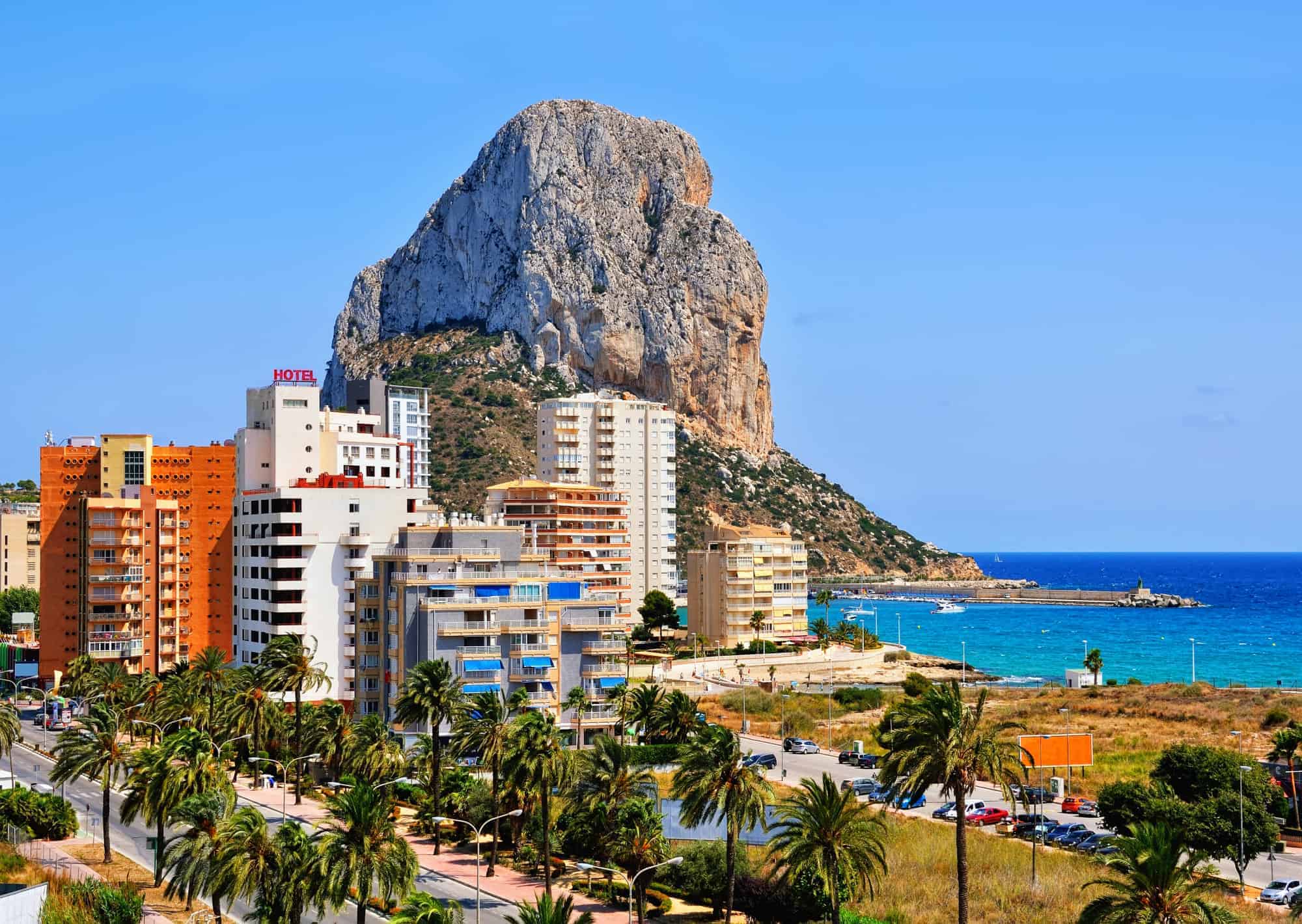
Alicante is cheaper than the UK, USA or Northern Europe. Food is considerably cheaper, particularly if you buy from a local market. Importantly, wine and beer are also cheaper.
Of course, property prices are a major factor for many expats.
Rent for an inner-city apartment in the Alicante province will set you back around €533 (£459) a month. If you are planning to rent, read our Renting In Spain guide first to make sure you know what to expect and how to protect yourself as a tenant.
If you’re looking to buy, there’s a bit more variation in price. Somewhere like Benidorm will cost around €2,100 (£1,808) per square metre, while Elche is around €1,200 (£1,000) per square metre. Of course, more rural areas will usually be cheaper and you’ll have more opportunities for renovation projects too.
To understand how the property purchasing process works in Spain and how to avoid possible pitfalls, read our Buying A Property In Spain guide.
Basic utilities are obviously important too. Things like heating and water will set you back around €95 a month, while internet is around €35 a month. Internet speeds vary across the province with rural areas having much slower connectivity than towns and cities.
While this might not be a massive issue, bear it in mind if you plan to do remote work or want to remain in frequent video contact with friends and family back home.
The amount of money you need to live comfortably in the Alicante province varies depending on where you settle down. If you’re living on the Costa Blanca, up to €2,500 a month will be enough. But for rural areas, you could do fine on €1,500 a month.
Where do most expats live in Alicante?
The Alicante province is home to the highest proportion of British expats in Spain. However, all other nationalities can be found here too.
As is expected, expats collect in larger towns and cities, including Calpe, Benidorm, Torrevieja, Javea, and Rojales.
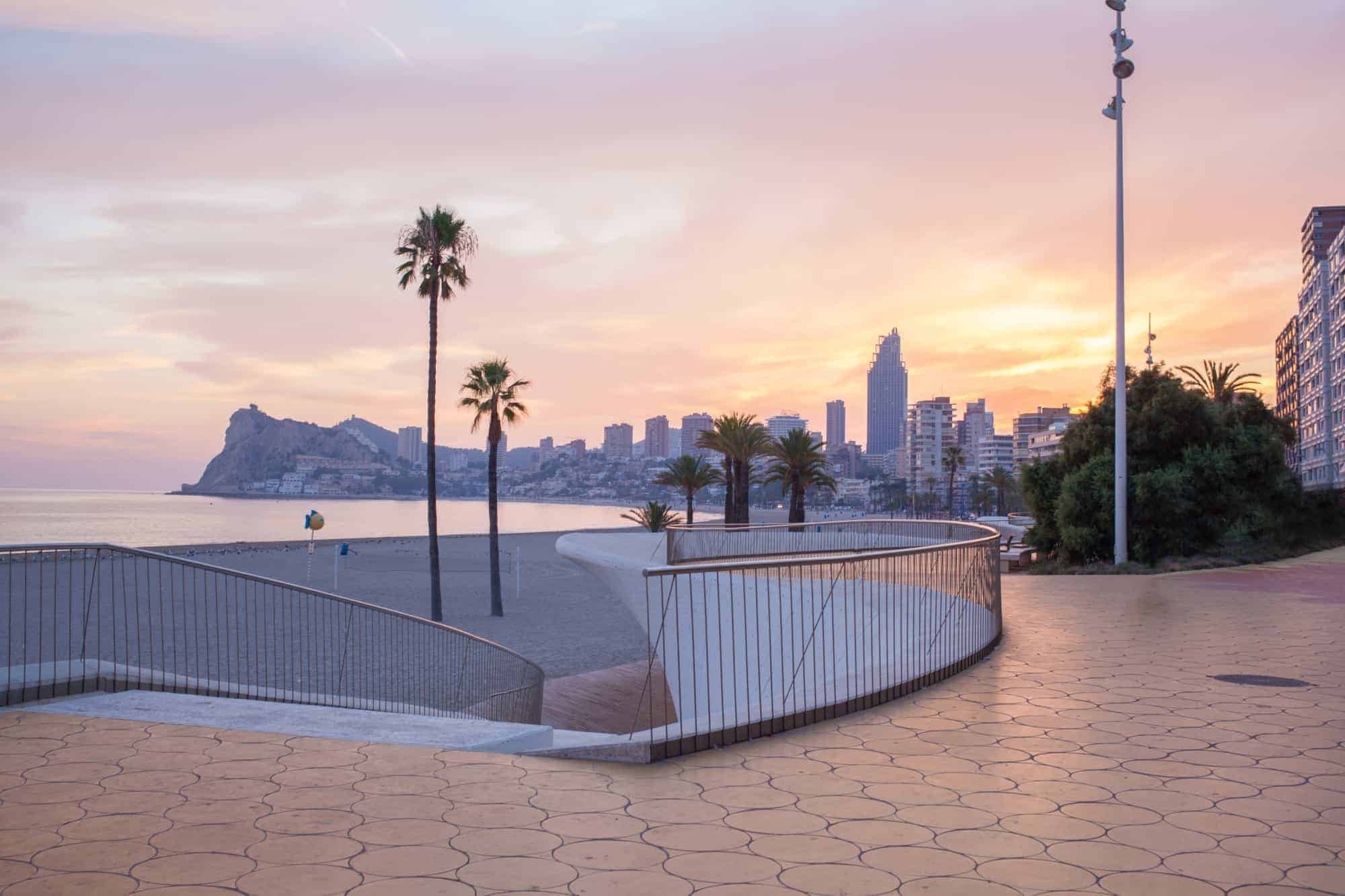
These areas are popular choices because they’re close to international transport hubs or are popular tourist destinations, making them good for establishing a local business.
If you want to find a bustling community of expats, one of the above towns will be a perfect choice. Of course, if you want to enjoy the Costa Blanca and Alicante province with minimal expat connections, look for a town or village further inland.
Expat communities near Alicante
Finding expats in the Alicante province is as easy as walking down the street in off-season. But if you want a slightly more dedicated method, there are a few options.
You can join a Facebook group, such as Expats Alicante. As the name implies, it’s a group for expats in Alicante. It’s another good resource for events and getting your questions answered.
If you decide to learn Spanish, finding classes through expat communities is a good way forward. Not only will the classes be geared towards people in your situation, but it’s also easy to make friends through them.
The best places to live in the Alicante province
Alicante province has a considerable variation between its towns and cities. This gives you plenty of options for where to settle down, but here are some of the highlights.
1. Elche
Elche is slightly further inland than the city of Alicante and is home to three separate UNESCO World Heritage sites. The city is also known for its Moorish architecture, which sets it apart from other towns and cities in the area. It’s a good choice if you like historic culture.
2. Calpe
Calpe is located on the doorstep of the Penyal d’Ifach nature reserve. There are plenty of opportunities for hiking and bird watching, while the town itself is full of amazing bars and restaurants. It’s home to a sizeable expat community but isn’t a significant tourist hotspot.
3. Guadalest
Guadalest is a relatively small town hidden in the mountains. It has some beautiful scenery and is relatively undisturbed by tourism. Guadalest is a great choice if you want to spend your time outdoors.
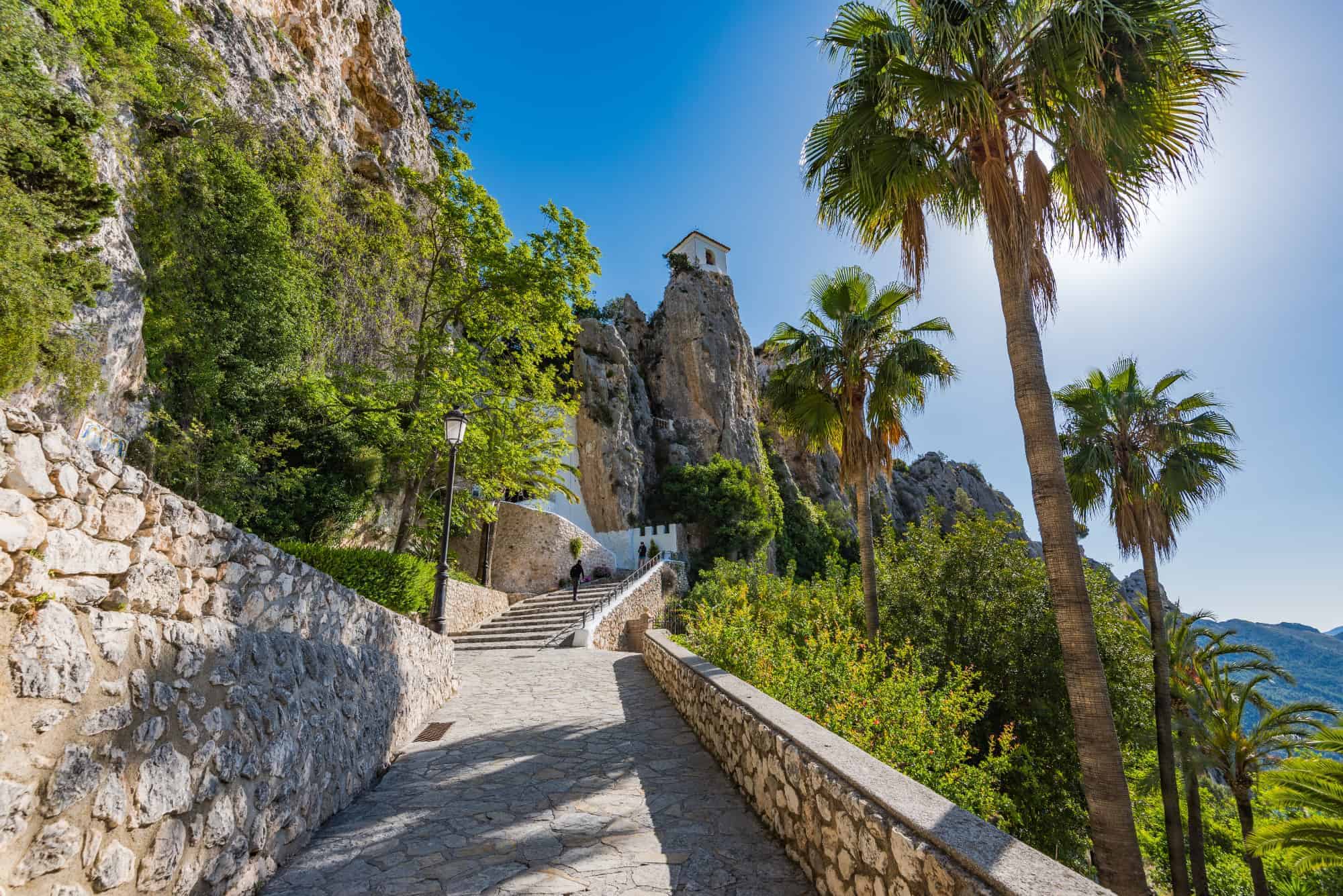
Is it better to rent or buy a property on the Costa Blanca?
The Costa Blanca and the wider Alicante province have plenty of opportunities for both renting and buying. But Spain is known to have a potentially difficult property market if you’re inexperienced, so ensure you do research first.
Using an estate agent is almost a must, but you can deal privately if your Spanish is good and you understand the market. Estate agents in the Alicante province will almost always speak English because it’s such a popular destination for foreign buyers.
One thing to be wary of, however, is the lack of regulation in the industry. Sellers hire estate agents, and this can lead to a degree of subjectivity when showing a property. Make sure you view a property in full and never make any upfront payments.
Similarly, estate agents can suggest using their connections during the buying process. But to avoid any snags or later legal issues, it’s definitely worth organising your own lender (if necessary), notary and solicitor.
If you don’t feel confident doing this, there are plenty of relocation services designed specifically to help expats move to Spain.
It can be a good idea to take advantage of the holiday rental market for cheap rates during the off-season. Many landlords would jump at the opportunity to make some profit during these drier months, so you can use this as a way to find the best permanent destination.
- Renting a Property in Spain? How to do it the right way
- A Complete Guide To Buying A Property In Spain
Where to buy a property on the Costa Blanca
The Costa Blanca almost feels like a separate entity from the Alicante province. Of course, settling down here is effectively about choosing which beach appeals to you most. Here are the top choices for where to buy a property on the Costa Blanca.
1. Benidorm
It’s fair to say Benidorm isn’t for everyone. It’s a popular tourist destination and exemplifies all the pros and cons that come along with this status. Importantly, it’s home to some great restaurants and bars, and has great nightlife. However, it turns into something of a ghost town in the off-season. You can find out more in our Living In Benidorm guide.
2. Guadamar
Guadamar is slightly further off the tourism radar but has benefitted from recent investment. It’s home to some glorious beaches and beautiful parks and it feels like a paradise, even among some of the gems of Alicante.
3. Villamartin
Villamartin is located fairly close to the province’s best golf courses. Property can get slightly expensive here because many apartments function purely as holiday rentals, so availability isn’t always great.
Final thoughts on living in the Alicante province and Costa Blanca
The Costa Blanca is a massive tourist destination, but that doesn’t mean there’s no appeal for expats looking to settle down permanently. After all, the area is famed for its weather and beaches, so what’s not to love?
Alicante’s large number of expats can be a good way of integrating into communities and making friends, but it might be a downside for some. Of course, if you feel this way then it might be worth looking elsewhere in Spain for a more authentic experience.
Use the off-season rental market as a way to experience long-term residency in the Alicante province and decide where you should settle down. Regardless of where this might be, the Alicante province and Costa Blanca make great choices for expats.
Other popular locations in Spain to consider:
- All About Living On The Costa De La Luz, Spain As An Expat
- The Guide To The Spanish Costas For Expats
- Living In Murcia And The Costa Cálida As An Expat
- Living In The Canary Islands: The Pros & Cons For Expats
- Living On The Costa Blanca In The Province Of Alicante
You might find helpful:
- Living In Spain As An Expat - the ultimate relocation guide full of practical information and tips on moving to Spain from the pros and cons to visas and residency, to the cost of living, healthcare, banking and more.
- Best Places To Live In Spain – the best and most popular expat locations in Spain.
- The Expat Guide To UK Pensions Abroad: Understand Your Options
- Didn’t find what you were looking for or need further advice? Comment with your question below and we will do our best to help.
Secure Peace of Mind with Best-Value International Health Coverage
International Citizens Insurance provide free, no-obligation quotes from the leading international health insurance providers with plans tailored to meet your needs. Trusted by thousands of expats worldwide.




